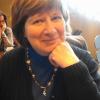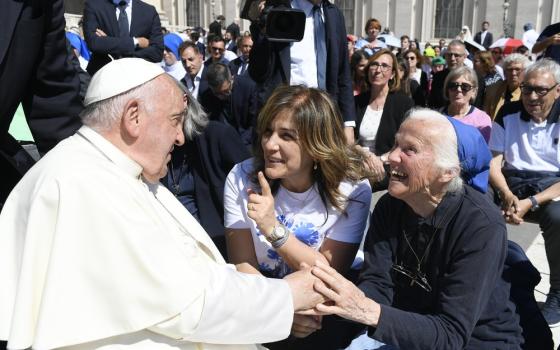Sr. Marie Stella Kouak, a member of the Sisters Hospitallers of the Sacred Heart of Jesus, holds babies who live at the St. Monique orphanage in Togo. She cares for children living with AIDS/HIV or who have had one or both parents die of the disease through the organization she founded 21 years ago, Vivre dans l'Espérance (To Live in Hope) Her work has gotten wide acclaim internationally, but now she and the people she serves face additional challenges with COVID-19. (Provided photo)
Editor's note: Since this article was reported earlier this year, COVID-19 has now reached Togo, a small country in West Africa between Benin and Ghana, where Sr. Marie Stella Kouak cares for AIDS-HIV patients and orphans through the organization she founded 21 years ago, Vivre dans l'Espérance (To Live in Hope).
Confinement measures began April 2 by the government to prevent the spread of COVID-19. These measures are still in force. This makes the task of providing food and medicine to sick and vulnerable people even more difficult: They are not allowed pick up their medicines themselves at the health center. This means that medicines have to be delivered by members working for Sister Marie Stella's association. Not many cases have been found, but it is very important for people who are HIV-positive to avoid potential COVID-19 carriers.
Sister Marie Stella's association has joined with others to call for help from donors abroad through a new organization "Enfants de l'Espoir" (Children of Hope).
Nourato Yacoubou has been a member of the association Vivre dans l'Espérance, (To Live in Hope), since the death of her mother, when she was a young child.
"This is my second home," she says in the association's newsletter. After graduating in finance at the University of Lomé in Togo, Noura, as everyone calls her, has held several office jobs with the association, which provides support to nearly 1,500 children, people living with HIV/AIDS and orphans.
The association was set up by Sr. Marie Stella Kouak 21 years ago in Dapaong, a crossroads town in northern Togo, where roads from neighboring countries, Benin, Burkina Faso and Ghana meet.
Last September, Noura joined the Fraternité Hospitalière des Serviteurs de la Miséricorde (Hospital Fraternity of the Servants of Mercy) created in 2015, where Sister Marie Stella, the only nun engaged in the association, lives with five other women who work for Vivre dans l'Espérance. The building hosting her congregation is within walking distance, located between the two orphanages, next to the hospital.
"The fraternity is a place of the church, with a chaplain," Sister Marie Stella told GSR on a visit earlier this year to Paris to meet donors and finish a book she is writing to explain her work. "It is also a place where every woman, Christian or not, is welcome," she said.
Sister Marie Stella used to live with other sisters from her congregation, the Sisters Hospitallers of the Sacred Heart of Jesus (Hospitalière du Sacré Coeur de Jésus), in Dapaong. In 2015, she then moved to a separate house with young women working for Vivre dans l'Espérance.
Nourato (Noura) Yacoubou has been a member of the association Vivre dans l'Espérance, (To Live in Hope) since the death of her mother, when she was a young child. In September, she joined the Fraternité Hospitalière des Serviteurs de la Miséricorde (Hospitalier Fraternity of the Servants of Mercy) created in 2015, where Sr. Marie Stella Kouak, the only nun engaged in the association, lives with five other women who work for Vivre dans l'Espérance. (Provided photo)
When young women religious here are found out to be HIV-positive, their mother superior usually asks them to leave their congregation. After meeting several young women who were sisters or were hoping to become nuns but were rejected by religious congregations when they told them they were HIV-positive, Sister Marie Stella felt she had to welcome them to a place where they could live their commitment to religious life. The Fraternité Hospitalière des Serviteurs de la Miséricorde was set up then.
"In Africa, convents are reluctant to welcome people who are sick with AIDS," Sister Marie Stella explained. "This sickness scares people."
Every morning, with other people working for Vivre dans l'Espérance and sometimes young volunteers from Europe spending a few weeks or a few months to help the association, members of the fraternité attend Mass and pray together.
Noura, who is Muslim, is not the only person of her faith working for Vivre dans l'Espérance. A few members of the hospital staff, including the only doctor, are Muslim, too. Altogether, the association provides help to about 1,500 sick children. About 350 of them are from Muslim families. There are also many small Protestant communities and many sects in this region of northern Togo.
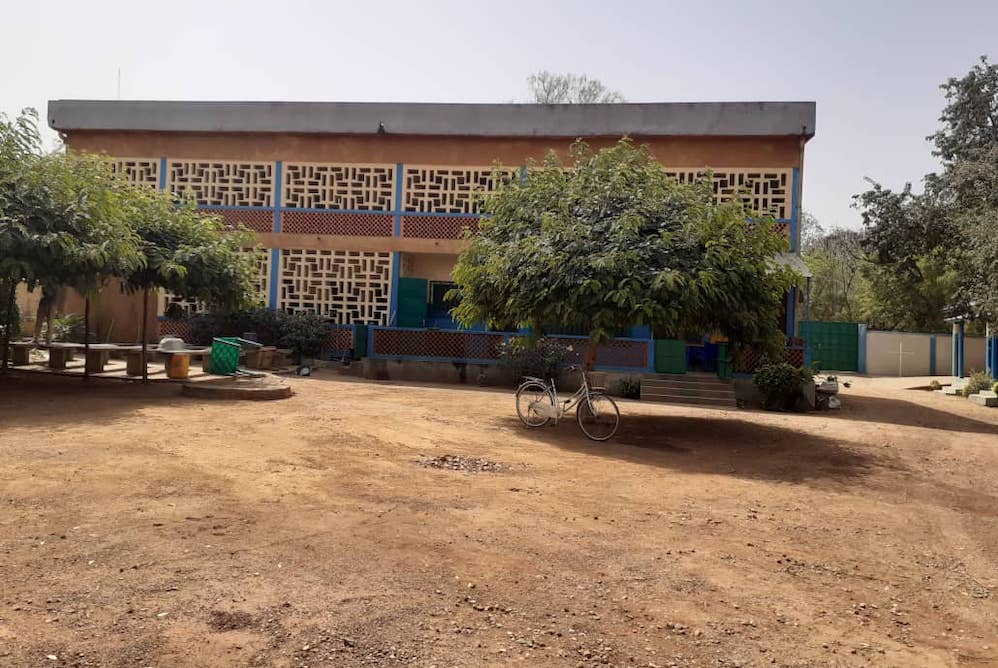
This diocesan building houses the Fraternité Hospitalière des Serviteurs de la Miséricorde (Hospitalier Fraternity of the Servants of Mercy) created in 2015, where Sr. Marie Stella lives with five other women who work for Vivre dans l'Espérance. (Provided photo)
Dapaong is an important place for trade in West Africa because of its location and bordering countries. Trade activities are mainly run by Muslims, who form about 30% of the population of the region; about a quarter of Togo's population is Muslim. The others are Christians, especially in cities, and animists, with a lot of people holding to both beliefs. The Christian community is dominated by evangelical Protestant.
As Togo is struggling with economic difficulties — climate change means the rainy season is shorter and crops not as abundant as they used to be — Sister Marie Stella is also struggling to keep Vivre dans l'Espérance alive.
"People do not die from AIDS the same way as before. They die of consequences of the virus: They die of malnutrition, because the country is poorer and poorer," she told GSR in a follow-up email a few weeks ago. Now the threat posed by the COVID-19 makes this danger more real.
The government decided to confine people where they live. This means some of them cannot go to the health center to get their medicines.
"Restrictions of circulation do not really take into account reality, like other pathologies," she told the magazine Le Pèlerin May 21. "People here live day by day. If they are not able to sell whatever they have on the market in the morning — because they are not allowed to go to the market — they cannot buy the rice they need for the evening meal."
The risk is that confinement provokes more deaths than COVID-19, which is spreading very slowly in Africa.
Advertisement
Children helped by Vivre dans l'Espérance live with members of their extended family or foster parents. Sometimes, Christian moms take care of Muslim children just as Muslim mothers help Christian ones. Some, who do not have anybody to take care of them, go to live in one of two orphanages: St. Augustin houses 60 boys, and St. Monique is home for a 100 little girls and babies.
Noura (whose name means "light" in Arabic) says she had no trouble integrating in this Christian community.
In the beginning, some of her relatives were not happy to see her as a member of this community. She explained how this was not a problem:
"Although I am in a Christian community, I freely practice my religion during worship hours," she is quoted as saying in the association newsletter. "This closeness between our religions makes me discover little-known facets of Christianity, this fraternal life, of love and mutual aid, even if we all come from various backgrounds. This communion with others and this unconditional love for his neighbor give me a new breath of life and allow me to develop this different way of seeing things, seeing life as a whole and especially getting the sense of love and sharing for those who need it."
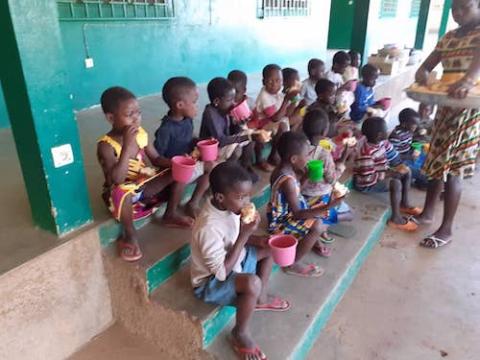
Boys and girls eat at the school in Dapaong, Togo, which is now closed because of coronavirus restrictions. (Provided photo)
One family
At Sister Marie Stella's organization, Muslim children study the Quran when Christians go to catechism class. "We live in fraternity," she said. "We do not make a difference between the children, based on religion or anything else."
A few years ago, she recalled, "just before Christmas, an imam sent us five sacks of rice with a message saying that they were intended for the Muslims in our care: I wrote him a message saying: 'Take back what you're offering. Here we share everything with everyone, we don't make a difference between Muslim and Christian children.' Since then, he has always sent us food at the end of Ramadan, for all the children!"
"We are all children of one family," said Noura.
Links with Muslims are also made through sponsorships, which the association establishes for children. None of the sponsors ever refused to take financial care of a child because they are Muslim, stressed Sister Marie Stella.
"The Christian religion is seen as one of many faiths [in Togo]" she said. "Christians are considered as people who are eager to make peace. I am welcomed everywhere I go. I talk to everybody, I offer medical help if they are sick. We get to know each other, to build trust. When we are turned down, it is often due to ignorance."
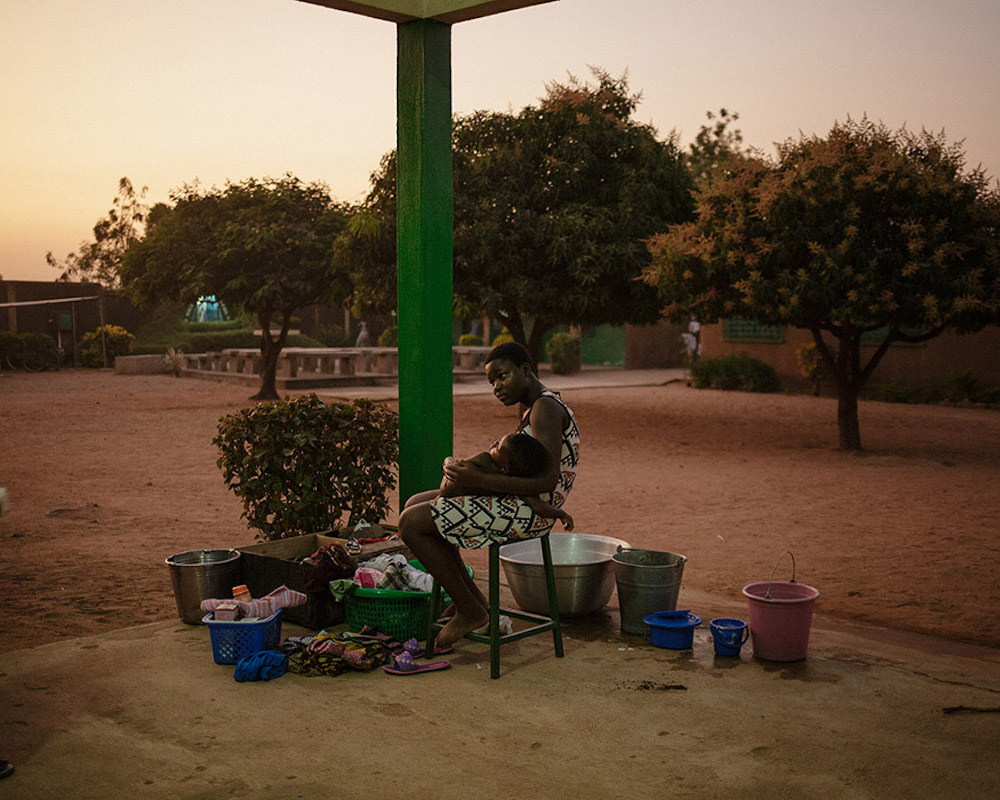
Cecile, 17 years old, is washing Vianney, a young boy who arrived recently to the St. Augustin orphanage of the Emmanuella, 14, sits on her bed in St. Monique House, the orphanage for girls run by the Vivre dans l'Espérance association in Dapaong, Togo. (Julien Pebrel/Myop) association in Dapaong, Togo. (Julien Pebrel/Myop)
A Muslim community lives 70 kilometers from Dapaong. As in most religions, Sister Marie Stella noted that compassion is a strong value in Islam.
"Women are the ones who take men to consult," she said. "Sick women take their treatment more willingly, they see that they get better. Then, they manage to convince their husband to come and see us. But it's like in all religions, man is always more important than woman!"
She continued, "It is not by talking about God that we will make people want to listen to us, it is by practicing love for our neighbor. Our testimony must challenge the other. The God of love speaks by his actions."
Sisters have had a positive influence on the spread of Christianity in the region, she said. "When the sisters first came to this part of Togo in 1962, priests talked about God and nobody was very interested. But then they saw the good work the sisters did and thought: 'What the sisters are doing is good; the priests must be right then,' " Sr. Marie Stella remembers with a smile.
"A lot of people say they do not believe in God. But the question is not whether you believe or not. The question is whether you are capable of giving love."
Young volunteers from France come for a few weeks, usually during summer vacations, to work with Vivre dans l'Espérance. Due to the COVID-19 pandemic, however, this year no one has been able to come.
Of usual times, Sister Marie Stella said, "They are happy to share our life and discover Africa. In our culture, when a foreigner comes and sees us, it is God who comes to us. Visiting Westerners make it easier for me: When I go and visit a sick family, if I am with a white person, they are more ready to welcome me. Westerners are seen as superior because they have money."
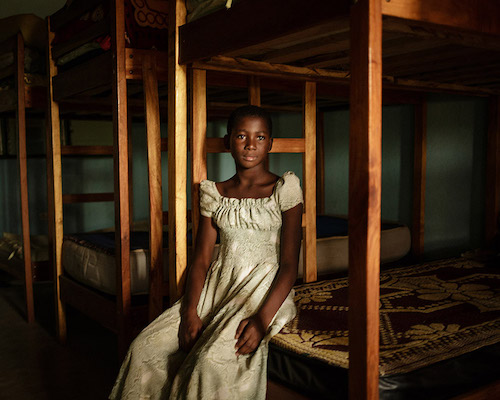
Emmanuella, 14, sits on her bed in St. Monique House, the orphanage for girls run by the Vivre dans l'Espérance association in Dapaong, Togo. (Julien Pebrel/Myop)
Images of God led to religious vocation
"I was 15 when I started to think I wanted to become a religious woman. While preparing for confirmation, we were singing a hymn: "Every man is a sacred story, every man is an image of God. It was a revelation: Every person, street children, poor people, were images of God. I then decided to work to help the poor," Sister Marie Stella wrote in a book published in 2013, Vivre dans l'espérance.
She spent some time with the congregation of the Augustinians Sisters of The Mercy of Jesus (Augustines Hospitalières de l'Immaculée Conception) in Dapaong. She later went to France and Belgium to train as a nurse before coming back to Togo in 1997. She created "Vivre dans l'Espérance" to help children who were sick with AIDS or had been made orphans by the disease.
"Africa is continent where all religions are present. Everyone talks about God," explained Sister Marie Stella, but in their own way. "Once, I went to visit a sick person who was a Protestant. A Protestant pastor who is a friend of our community came along, and it was easier then to get to know and talk to this family. "
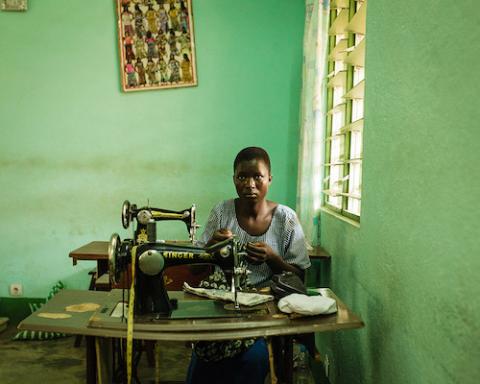
Forzia, 18, works in the sewing shop of the Vivre dans l'Espérance association to learn to be a dressmaker. (Julien Pebrel/Myop)
"For us, it is very simple: Our language is love. Anyone working with us shares the same spirituality, which is love. Without love, we cannot do anything. We are dealing with children who have had a very difficult life. Some of them have been rejected because they were sick, and everybody is afraid of the HIV virus."
Sister Marie Stella insists on the importance of prayer: "The children can call each other brother and sister because they pray together every night. All the children who live in the orphanages, girls and boys, Christians, Muslims, all of them pray together."
She has applied for nongovernmental organization status to get more funding. Right now, her association gets medicines from the Global Fund to Fight AIDS, which also pays the salaries of four members of the medical staff.
The doctor is helped by three nurses, a midwife, some medical technicians and a pharmacist.
Needs are always increasing. For example, the fraternité is housed in a building that belongs to the diocese, but funds are needed to find another place soon.
Her work is financed mainly by private donors in France where she lived and Belgium where she trained to become a nurse.
Different people support us, Sister Marie Stella said: "There is even a man who send us money from abroad even though he is a Buddhist," she told GSR with a smile.
[Elisabeth Auvillain is a freelance journalist based in Paris.]
